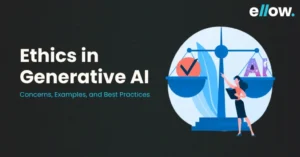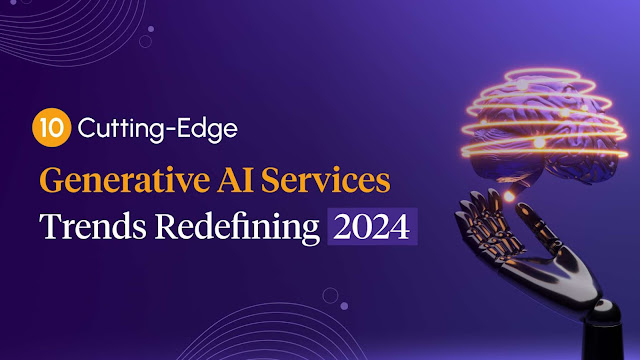 Understanding Ethical Issues in the Use of Generative AI Technologies
Understanding Ethical Issues in the Use of Generative AI Technologies
Can machines create without crossing ethical boundaries? As generative AI reshapes content creation across industries, it brings forth pressing ethical considerations. This technology, capable of generating text, art, and music, introduces challenges around authenticity, privacy, and bias that are too significant to overlook.
Ensuring responsible use of generative AI involves grappling with questions about data integrity, intellectual property rights, and the transparency of AI processes. As we delve deeper, it’s imperative to balance innovation with ethical standards to ensure that generative AI benefits all without causing unintended harm.
Ethical Implications Of Generative AI
Here is the potential list of some of the ethical considerations that people must take into account while using gen AI tools:
1. Environmental Impacts

The environmental footprint of generative AI is an often overlooked aspect amid its technological allure. The environmental impacts of generative AI are profound, as building, training, and using these models consume significant energy and contribute to carbon emissions. Additionally, the cooling systems for AI data centers demand substantial water resources. As technology advances, it’s crucial to weigh its benefits against these environmental costs.
Researchers and companies are striving to develop more sustainable AI practices, but users must also adopt responsible usage. By considering the environmental footprint, we can make informed decisions about deploying generative AI, ensuring that its advantages are balanced with ecological mindfulness.
2. Misinformation and deep fakes
Generative AI holds the power to create content that adeptly mimics reality, raising significant concerns about misinformation and the rise of deepfakes. These AI-generated fabrications can dramatically warp public perception, spreading falsities and potentially causing severe consequences for individuals and organizations alike. The ability to manipulate images and videos to produce seemingly real but entirely false content threatens to undermine trust in media and public figures.
Recognizing these risks, it is imperative for both creators and consumers of AI-generated content to prioritize transparency and invest in technologies that can detect and debunk these falsehoods. Businesses and platforms are stepping up, implementing advanced detection tools and collaborating with fact-checkers to safeguard the integrity of information. Such proactive measures are crucial in maintaining public trust and preventing the harmful spread of AI-generated misinformation.
3. Bias and fairness
The ethical challenge of bias in generative AI is profound, stemming directly from the data used to train these models. If the data reflects biases, the AI’s outputs inevitably do too, potentially perpetuating stereotypes and unfairness. This can lead to skewed decision-making in critical areas like recruitment, law enforcement, and loan approvals, reinforcing societal inequities rather than dismantling them.
To combat this, it’s essential to employ diverse datasets and involve varied perspectives in the AI development process. Ensuring fairness involves rigorous scrutiny of training data and continuous monitoring for bias. By committing to these practices, developers can guide generative AI towards more equitable outcomes, promoting trust and fairness in technology applications. This commitment is crucial for building AI systems that truly benefit all segments of society.
4. Privacy and security concerns
Generative AI, while promising, raises significant concerns about privacy and security. The vast datasets used to train AI models often contain sensitive personal information like names, addresses, and SSNs. Exposing such data can invite identity theft and other malicious activities by hackers.
To mitigate these risks, strict adherence to privacy guidelines and data protection laws is essential. AI developers and companies must prioritize safeguarding personal information throughout the AI lifecycle. This commitment ensures that AI systems uphold trust and protect user privacy effectively.
5. Copyright and intellectual property
Generative AI’s ability to replicate copyrighted material raises critical concerns regarding intellectual property rights.
Unauthorized use of copyrighted content can lead to legal disputes and damage to reputations, especially in industries like music, where AI-generated compositions resembling copyrighted songs could prompt legal action and public scrutiny.
To mitigate these risks, it’s crucial to ensure that AI training data respects copyright laws. Transparent documentation of content origins through metadata tagging and licensing agreements is essential. Platforms like Jukin Media provide mechanisms to secure rights for user-generated content, offering a model for responsible AI use that protects against inadvertent infringements.
6. Accountability
Navigating accountability in the realm of generative AI involves addressing complex challenges to ensure responsible deployment and mitigate risks.
Without clear guidelines, incidents involving AI-generated content can lead to confusion and disputes over who is responsible, potentially damaging trust and brand reputation. Consider recent controversies where AI chatbots disseminated inappropriate content—such incidents highlight the critical need for transparent accountability frameworks.
Establishing robust policies akin to platforms like X (formerly known as Twitter), which define boundaries for synthetic media and provide mechanisms for user feedback, is crucial. These measures not only safeguard against misuse but also foster transparency and accountability in the ethical use of generative AI technologies.
7. Replace human workforce
Generative AI’s rapid advancements raise concerns about its potential to replace human labor. While AI can enhance efficiency and reduce costs for businesses, it also poses risks of displacing human workers. This shift challenges us to consider ethical implications, balancing technological progress with societal impacts.
To mitigate these risks, prioritizing responsible AI development is crucial. This involves setting clear ethical standards that prioritize human welfare and minimize job displacement. Additionally, promoting transparency and explainability in AI systems ensures stakeholders understand their function and impacts, fostering trust and ethical deployment practices in the evolving landscape of generative AI.
8. Lack of transparency
Lack of transparency in generative AI poses significant ethical challenges, particularly when users are unaware of how AI models generate outputs or the sources of the data they are trained on. This can lead to misinformation if the AI unintentionally produces factually incorrect results due to errors in its training datasets.
To address these concerns, it is vital to adopt several ethical practices:
l Clear Disclaimers and Limitations: Users should be informed about the limitations of AI outputs through clear disclaimers, emphasizing the importance of verifying information with credible sources.
l Promote Critical Thinking: Encouraging users to develop critical thinking skills can help them better evaluate the accuracy and credibility of AI-generated content.
l Transparency about Data and Training: Sharing detailed information about the data sources and training methods used to develop AI models allows users to understand and possibly anticipate biases and limitations.
Implementing these guidelines helps build trust and fosters a more informed user base, ensuring that generative AI is used responsibly and ethically in various applications.
9. Regulatory compliance
Regulatory compliance is crucial in the ethical use of generative AI, ensuring transparency and accountability:
l Adherence to GDPR and HIPAA: Generative AI must comply with regulations like GDPR and HIPAA to safeguard sensitive information.
l Compliance audits: Regular audits and monitoring processes verify that AI practices align with legal requirements.
l Explainable AI: Develop AI models that are transparent, allowing users to understand data usage and privacy implications.
l Data subject rights: Provide mechanisms for individuals to access, correct, and delete their data as per regulatory mandates.
l Informed consent: Obtain explicit consent from users, informing them about data processing risks and benefits.
By prioritizing regulatory compliance, businesses uphold ethical standards and build trust in generative AI technologies.
Essential AI Practices Everyone Should Know
In today’s rapidly evolving technological landscape, the responsible use of artificial intelligence is paramount. As businesses and organizations integrate AI into their operations, understanding and implementing ethical practices not only mitigate risks but also enhance trust and efficiency. Here’s a comprehensive guide to essential AI practices that every user and organization should embrace:
l Stay Informed and Adaptive: Keeping abreast of AI trends and data ethics is crucial. This empowers organizations to uphold robust data security measures and adapt management strategies that foster growth while safeguarding against potential risks.
l Transparency in Data Handling: Businesses leveraging AI must be transparent about how customer data is collected, used, and protected. Clear communication regarding data handling practices enhances customer trust and compliance with data protection regulations.
l Employee Training and Awareness: Proper training for staff on AI usage is essential. Employees should understand both the benefits and limitations of AI systems, along with industry-specific regulations. This ensures responsible and effective utilization of AI tools across all operational levels.
l Adherence to Global Ethical Standards: Aligning AI practices with international ethical guidelines, such as those set by UNESCO, promotes values like human rights, diversity, and environmental sustainability. These standards provide a framework for ethical decision-making and policy development within organizations.
l Engagement with Ethical AI Communities: Collaborating with ethical AI communities and institutes encourages ethical literacy and addresses common AI challenges. By participating in discussions on transparency, accountability, and data privacy, organizations can enhance their AI frameworks to ensure safety and reliability.
By embracing these practices, businesses can harness the full potential of AI while mitigating ethical risks and contributing positively to their industry and society at large. Ethical AI usage not only protects against misuse but also cultivates a culture of responsibility and innovation in the digital age.
Explore the top 10 AI tools of today to amplify your daily productivity if you’re tech-savvy and already using generative AI tools like ChatGPT at work!
Top Generative AI stats for 2024
Generative AI is rapidly gaining traction worldwide, transforming how individuals and businesses interact with technology. Here are some key insights from recent surveys and studies:
l In India, 73% of the surveyed population is actively using generative AI, highlighting strong adoption driven by technological enthusiasm and cultural factors.
l Australia follows closely with 49% adoption, reflecting a robust interest in leveraging AI for both personal and professional applications.
l In the US, 45% of the population engages with generative AI, underscoring its integration into mainstream digital interactions.
l The UK shows a slightly lower adoption rate at 29%, indicative of varying levels of familiarity and acceptance across regions.
Demographically, Millennials and Gen Z lead the charge as “super-users,” with 65% of generative AI users belonging to these cohorts. A significant 72% of users are employed, emphasizing its utility in professional settings. Moreover, 52% of users trust generative AI for informed decision-making, illustrating growing confidence in AI’s capabilities.
Looking ahead, there is a notable shift towards integrating generative AI into workplace tasks, with 75% of users aiming to automate work processes and improve communication efficiency. Despite these advancements, there remains a significant gap between adopters and non-users, primarily driven by concerns over safety, education, and integration into daily life.
As generative AI continues to evolve, these statistics underscore its transformative potential and the ongoing dialogue surrounding its ethical, practical, and societal implications.
Final Thoughts
Generative AI represents a powerful tool with the potential to transform industries by enhancing creativity and efficiency. However, the deployment of this technology carries significant ethical responsibilities. It’s essential to consider the broader implications, including the risk of perpetuating biases, violating copyright laws, and compromising data privacy.
As we integrate generative AI into our daily operations and societal functions, prioritizing ethical considerations is crucial. Ensuring that these systems are developed and used in ways that respect privacy, promote fairness, and protect intellectual property is key to harnessing their full potential responsibly.
Ultimately, the goal is to use generative AI not just to innovate but to do so in a manner that is aligned with core human values. By adhering to strict ethical standards, we can guide the development of generative AI towards outcomes that are beneficial and just, ensuring it serves as a force for good in society.


